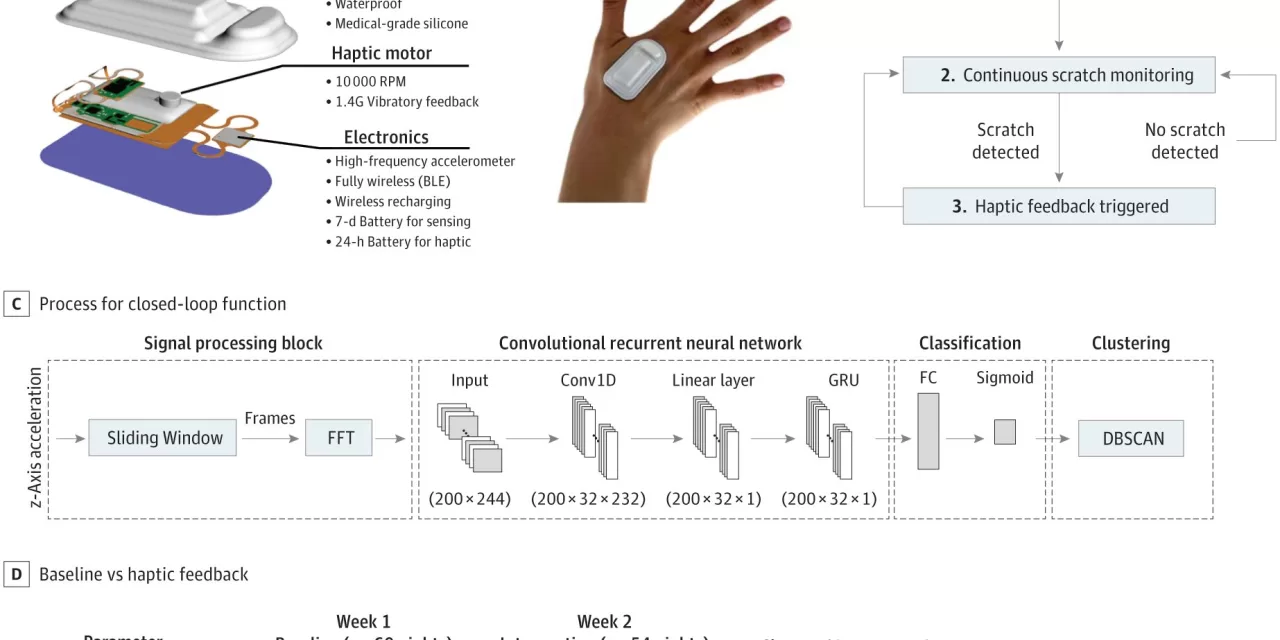Northwestern University Researchers Develop Innovative Nonpharmacological Intervention
A groundbreaking study from Northwestern University has demonstrated the effectiveness of an artificial intelligence (AI)-enabled wearable sensor in reducing nocturnal scratching among adults with mild atopic dermatitis. The study, published in JAMA Dermatology, found that the device significantly decreased scratching events and duration without affecting overall sleep opportunity.
Atopic dermatitis is a chronic skin condition characterized by persistent itching and inflammation. The itch-scratch cycle worsens inflammation and exacerbates symptoms, often disrupting sleep and causing fatigue. Traditional treatments focus on topical medications and systemic therapies, but nonpharmacological alternatives are gaining traction due to their potential for minimizing side effects.
Innovative AI-Powered Solution
The research builds on previous work validating an AI-driven wearable sensor (ADAM sensor, Sibel Health) for detecting nocturnal scratching. In this study, the sensor was enhanced with vibratory feedback to assess its role in curbing the automatic scratching response. The device, mounted on the dorsal hand, is composed of medical-grade silicone and equipped with wireless technology and a haptic motor that delivers 1.4G vibratory feedback at 10,000 RPM.
The study, titled Artificial Intelligence–Enabled Wearable Devices and Nocturnal Scratching in Mild Atopic Dermatitis, employed a single-arm, two-stage cohort trial design at Northwestern University’s Department of Dermatology. Researchers enrolled ten adult participants with mild atopic dermatitis and moderate to severe scratching, assessing disease severity using the Validated Investigator Global Assessment (vIGA) score.
Promising Findings
Participants wore the AI-sensor device for two weeks. The first week served as a baseline period with the feedback mechanism disabled. In the second week, the vibratory feedback was activated whenever the sensor detected scratching. Researchers collected data over 104 nights and 831 hours of monitoring, analyzing scratching events and durations using a validated AI algorithm.
The findings were significant:
- A 28% reduction in mean nightly scratch events (from 45.6 to 32.8 events per night).
- A 50% decrease in per-hour scratch duration (from 15.8 seconds to 7.9 seconds).
- No significant changes in total sleep opportunities were observed.
Most participants reported the device as user-friendly and expressed interest in continued use. Researchers suggest that the vibration may either disrupt subconscious scratching behavior or provide a counter-stimulus, reducing the urge to scratch.
Next Steps in Research
While these results are promising, further studies with larger participant groups, longer follow-up periods, and assessments of potential impacts on skin and daytime scratching behaviors are necessary to confirm the findings. Randomized controlled trials could provide more definitive evidence on the efficacy of this AI-enabled intervention.
For more details, refer to the study by Albert F. Yang et al. in JAMA Dermatology (2025), DOI: 10.1001/jamadermatol.2024.5697.
Disclaimer: This article is for informational purposes only and does not constitute medical advice. Individuals with atopic dermatitis should consult healthcare professionals before considering new treatments or interventions.











